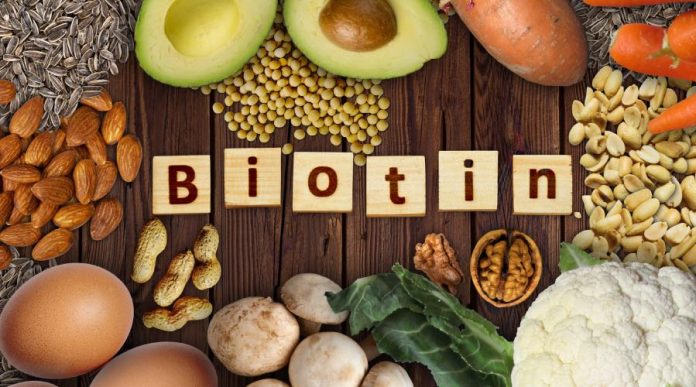Biotin, also known as Vitamin B7 or Vitamin H, is a water-soluble vitamin that plays a crucial role in various physiological processes. It is well-regarded for its potential benefits to skin, hair, and nail health, but its impact extends beyond just beauty enhancements. This article delves into the numerous health benefits of biotin, its functions in the body, sources, and considerations for supplementation.
What is Biotin?
Biotin is a member of the B-vitamin family, and it is essential for the metabolism of carbohydrates, fats, and proteins. It acts as a coenzyme in several key enzymatic reactions that help convert food into energy. Biotin is widely recognized for its role in maintaining healthy skin, hair, and nails, but its benefits span across several areas of health.
Health Benefits of Biotin
- Promotes Healthy Hair Growth
One of the most popular uses of biotin is for promoting healthy hair growth. Biotin deficiency can lead to thinning hair and hair loss. Supplementing with biotin is believed to strengthen hair follicles, improve hair texture, and enhance overall hair health. Although more research is needed to confirm the effectiveness of biotin supplements in hair growth, many people report noticeable improvements in their hair quality.
- Strengthens Nails
Biotin is known to improve nail strength and reduce brittleness. Studies have shown that biotin supplementation can help prevent nail splitting and breaking, leading to stronger and more resilient nails. This benefit makes biotin a common ingredient in many nail care products and supplements.
- Supports Healthy Skin
Biotin contributes to maintaining healthy skin by supporting cellular growth and repair. It helps in the production of fatty acids that keep the skin hydrated and supple. Biotin deficiency can cause skin issues such as rashes, dryness, and inflammation. Regular intake of biotin can help maintain skin integrity and promote a healthy complexion.
- Boosts Metabolism
Biotin plays a crucial role in the metabolism of macronutrients. It acts as a coenzyme in the breakdown of carbohydrates, fats, and proteins, facilitating energy production. By supporting efficient metabolism, biotin helps the body convert food into usable energy, which can contribute to overall vitality and well-being.
- Regulates Blood Sugar Levels
There is evidence suggesting that biotin may help regulate blood sugar levels, particularly in individuals with diabetes. Biotin, in conjunction with other nutrients, can improve glucose metabolism and insulin sensitivity. Some studies have shown that biotin supplementation can enhance glycemic control, although more research is needed to fully understand its impact on blood sugar management.
- Supports Cognitive Function
Biotin is involved in several metabolic pathways that are crucial for brain function. Adequate levels of biotin support cognitive health by contributing to neurotransmitter production and overall brain metabolism. While more research is needed to explore biotin’s direct effects on cognitive function, maintaining optimal biotin levels is beneficial for overall brain health.
- Promotes Heart Health
Biotin has been linked to cardiovascular health due to its role in lipid metabolism. By helping to regulate cholesterol levels and improve lipid profiles, biotin may contribute to reducing the risk of cardiovascular diseases. However, more research is required to establish a definitive connection between biotin and heart health.
Sources of Biotin
Biotin is found in a variety of foods, making it relatively easy to obtain through a balanced diet. Common dietary sources of biotin include:
- Eggs: Egg yolks are rich in biotin and can contribute significantly to daily intake.
- Nuts and Seeds: Almonds, walnuts, and sunflower seeds are good sources of biotin.
- Legumes: Beans, lentils, and peas provide a healthy dose of biotin.
- Whole Grains: Foods such as oats, barley, and whole wheat contain biotin.
- Fish: Salmon and other fatty fish are excellent sources of biotin.
- Dairy Products: Milk, cheese, and yogurt provide biotin as well as other essential nutrients.
Biotin Supplements
Biotin supplements are available in various forms, including tablets, capsules, and gummies. They are often marketed for their benefits to hair, skin, and nails. While biotin supplementation is generally considered safe, it is essential to follow recommended dosages and consult with a healthcare provider before starting any new supplement regimen.
Considerations and Potential Side Effects
Biotin is generally safe when consumed in appropriate amounts through diet or supplements. However, excessive intake of biotin can lead to potential side effects such as skin rash, digestive issues, and interference with laboratory test results. It is important to use biotin supplements as directed and to consult with a healthcare provider if you have any underlying health conditions or are taking other medications.
Biotin offers a range of health benefits, from promoting healthy hair and nails to supporting metabolic and cognitive functions. Its role in maintaining overall wellness makes it a valuable nutrient to include in a balanced diet. While biotin deficiency is relatively rare due to its presence in many foods, supplementation may be beneficial for individuals experiencing specific health issues or seeking to enhance their beauty regimen. As with any supplement, it is crucial to use biotin responsibly and seek guidance from a healthcare professional to ensure it aligns with your individual health needs and goals.















